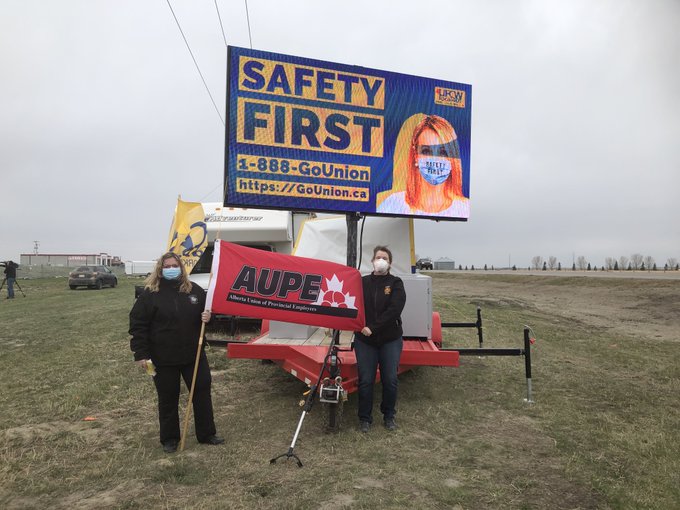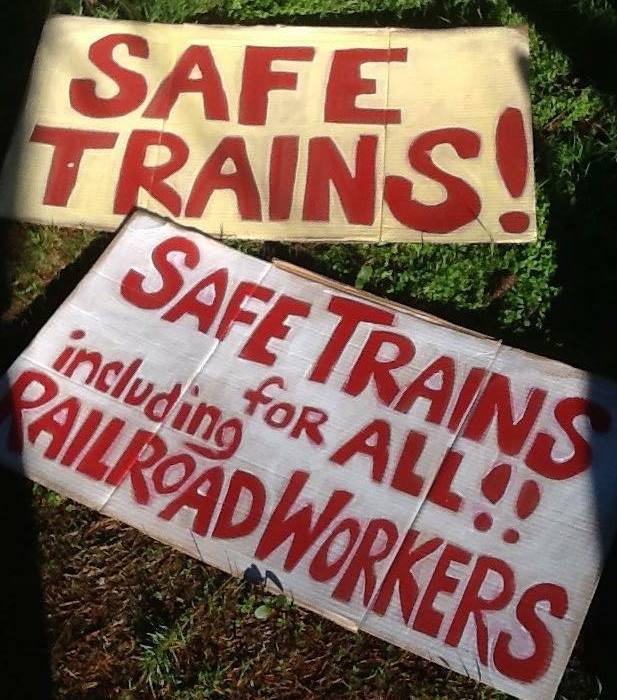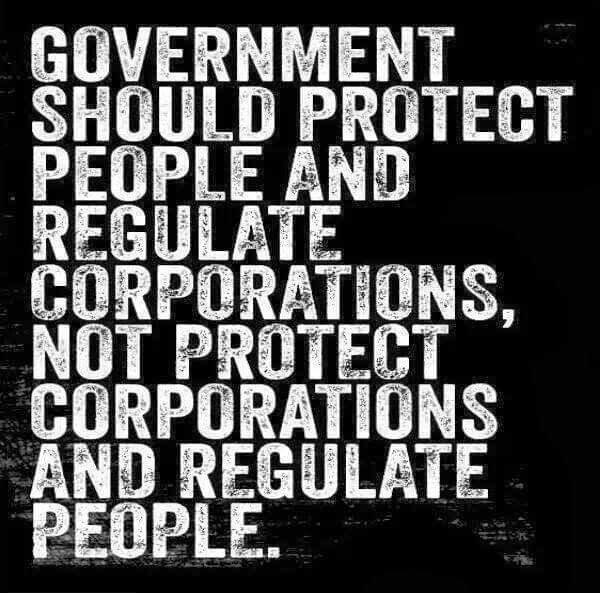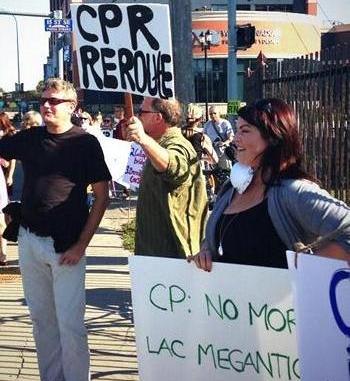|
May 3, 2021 - No. 39
Safety Concerns in Meatpacking Sector and Railways
Determined Fight of Alberta Workers and
Families for Safety of All Workers
- Peggy Askin -
  
Peggy Askin is the Vice-President of the
Calgary
Chapter of the
Congress of Union Retirees and a former
President of the Calgary and
District Labour Council.
Alberta workers
and families are stepping up their fight for
compensation for all injured workers and for
proactive measures to
protect all workers from further disease and
injuries and to hold
employers and government accountable.
One
industry where the workers and their organizations are very active in
demanding immediate protection is the meatpacking industry. The workers
in meatpacking plants have faced massive and repeated outbreaks of
COVID-19 in Canada, Quebec and the U.S. during the last year. Their
efforts have forced the Alberta government to establish vaccination
clinics at the Cargill plant in High River and the JBS plant in Brooks
where workers began receiving vaccinations on April 29. The Health
Minister announced last week that vaccinations would be provided for
all meatpacking employees across the province, more than 15,000 workers.
The Cargill plant in High River Alberta had
close to 1,000 workers
contract COVID-19 in the spring of 2020, the
largest packing plant
outbreak in North America. Two workers and a
family member of one of
the workers died. Almost one year later, in
February and March 2021
there was another outbreak at Cargill and, at
the same time,
there was a massive outbreak affecting over 500
workers at the Olymel
pork processing plant in Red Deer, Alberta. Four
workers died. In 2020
there was also a huge outbreak at the JBS plant
in Brooks and one
worker died. In 2005 the combined efforts of the
workers at the JBS
plant, including many who had emigrated from
Sudan and workers
who had moved to Alberta from Newfoundland,
succeeded in organizing
their plant and improving their working
conditions.
 The
workers and their organizations worked
tirelessly, demanding
measures be taken to protect them on the job and
for the temporary
closure of both Cargill in 2020 and Olymel
earlier this year to stop
further spread of the disease. Through their
actions they saved lives.
Before and after the shutdowns, their demands to
both of the huge
global
companies that own the plants and to government
and public health
officials included proactive measures, such as
increasing the distance
between work stations and decreasing production
line speeds so fewer
workers would be on the work floor. All the
while the Alberta
government, like other provincial governments,
refused to take
responsibility
for ensuring that employers took safety measures
to protect workers and
save lives. Far from taking responsibility to
ensure the health and
safety of workers, these governments are passing
laws that put workers'
lives in even greater danger. The
workers and their organizations worked
tirelessly, demanding
measures be taken to protect them on the job and
for the temporary
closure of both Cargill in 2020 and Olymel
earlier this year to stop
further spread of the disease. Through their
actions they saved lives.
Before and after the shutdowns, their demands to
both of the huge
global
companies that own the plants and to government
and public health
officials included proactive measures, such as
increasing the distance
between work stations and decreasing production
line speeds so fewer
workers would be on the work floor. All the
while the Alberta
government, like other provincial governments,
refused to take
responsibility
for ensuring that employers took safety measures
to protect workers and
save lives. Far from taking responsibility to
ensure the health and
safety of workers, these governments are passing
laws that put workers'
lives in even greater danger.
Governments are
active participants in making sure that these
huge
corporations do not have to take responsibility
for the safety of the
workers they employ. During the 2020 COVID-19
outbreak at the Cargill
plant in High River many workers courageously
exercised their right to
refuse unsafe work. Bill 47, the Ensuring Safety
and Cutting
Red Tape Act, 2020 which amends the
province's Occupational Health and
Safety legislation, comes into effect in
September 2021. Part of this
thoroughly anti-worker legislation is provisions
restricting a worker's
ability to refuse unsafe work.

September
13, 2013. Calgary demonstration against
CP Rail over derailments.
|
It
is not just workers and their unions who are
speaking out about
their concerns regarding dangerous working
conditions. Families are
speaking for justice for their lost family
members and to prevent
further loss of life. The families of
meatpacking workers and rail
workers killed on the job have succeeded in
having criminal
investigations
opened into the deaths of their family members.
The families of CN and
CP workers have initiated petition campaigns
calling for protection for
workers who speak out about the dangers in their
workplaces and to
bring an end to railway companies and their
private police forces being
in charge of investigating fatalities and
accidents which have
brought tragedy to workers and communities. Rail
workers report that
their health and safety conditions are
deteriorating, that old, unsafe
rail cars are being brought out for use. They
also report that, in
spite of federal Transportation and Safety Board
orders issued
regarding what must be done to stop runaway
trains after three railway
workers died
in a fatal derailment near Field, BC in 2019,
these violations continue.
Our security lies in our fight for the rights
of all and our
experience confirms that the fight for lives is
the fight for rights.

(To
access articles individually
click on the black headline.)
PDF
PREVIOUS
ISSUES | HOME
Website:
www.cpcml.ca
Email: office@cpcml.ca
|




 The
workers and their organizations worked
tirelessly, demanding
measures be taken to protect them on the job and
for the temporary
closure of both Cargill in 2020 and Olymel
earlier this year to stop
further spread of the disease. Through their
actions they saved lives.
Before and after the shutdowns, their demands to
both of the huge
global
companies that own the plants and to government
and public health
officials included proactive measures, such as
increasing the distance
between work stations and decreasing production
line speeds so fewer
workers would be on the work floor. All the
while the Alberta
government, like other provincial governments,
refused to take
responsibility
for ensuring that employers took safety measures
to protect workers and
save lives. Far from taking responsibility to
ensure the health and
safety of workers, these governments are passing
laws that put workers'
lives in even greater danger.
The
workers and their organizations worked
tirelessly, demanding
measures be taken to protect them on the job and
for the temporary
closure of both Cargill in 2020 and Olymel
earlier this year to stop
further spread of the disease. Through their
actions they saved lives.
Before and after the shutdowns, their demands to
both of the huge
global
companies that own the plants and to government
and public health
officials included proactive measures, such as
increasing the distance
between work stations and decreasing production
line speeds so fewer
workers would be on the work floor. All the
while the Alberta
government, like other provincial governments,
refused to take
responsibility
for ensuring that employers took safety measures
to protect workers and
save lives. Far from taking responsibility to
ensure the health and
safety of workers, these governments are passing
laws that put workers'
lives in even greater danger.
